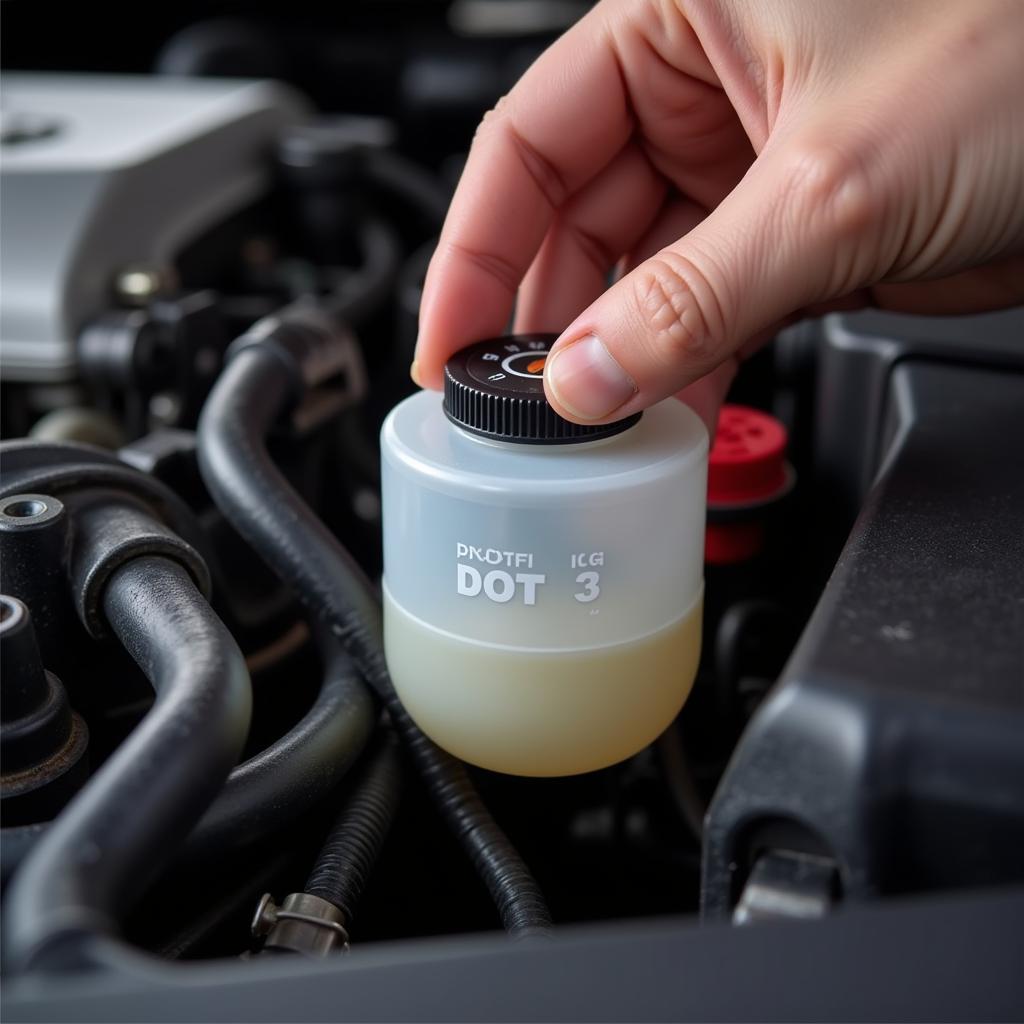The brake warning light on your Jeep JK is a crucial safety feature that shouldn’t be ignored. It can illuminate for several reasons, from low brake fluid to more serious issues with your braking system. This comprehensive guide will delve into the common causes of a brake warning light on a Jeep JK and provide potential solutions to help you get back on the road safely.
Understanding Your Jeep JK’s Brake Warning Light
When you start your Jeep JK, the brake warning light should illuminate briefly as part of the bulb check sequence. If it turns off after a few seconds, your brake system is likely functioning correctly. However, if the light remains on or illuminates while driving, it indicates a potential problem that requires attention.
Common Causes of a Brake Warning Light on Jeep JK
Several factors can trigger the brake warning light on your Jeep JK. Here are some of the most frequent culprits:
1. Low Brake Fluid
The most common cause of a brake warning light is low brake fluid. Your Jeep JK, like all vehicles with hydraulic brakes, relies on brake fluid to transfer force from the brake pedal to the wheels, enabling you to stop. If the fluid level drops below a certain point, the warning light will illuminate to alert you. Low brake fluid often indicates a leak in the system, which requires immediate attention.
2. Worn Brake Pads
Brake pads are essential components of your Jeep JK’s braking system, designed to wear down over time. As you apply the brakes, the pads press against the brake rotors, creating friction that slows the vehicle. When the pads wear thin, a sensor within the brake system triggers the warning light, indicating it’s time for a replacement.
3. Faulty Brake Light Switch
The brake light switch activates your Jeep JK’s brake lights when you press the brake pedal. In some instances, a malfunctioning brake light switch can also trigger the brake warning light on the dashboard. This usually occurs when the switch fails to return to its off position, leading the system to believe the brakes are constantly engaged.
4. ABS System Malfunction
Modern Jeep JKs come equipped with an Anti-lock Braking System (ABS) that prevents wheel lock-up during hard braking, enhancing vehicle control. If the ABS system encounters a problem, it can trigger the brake warning light along with the ABS warning light. This could be due to a faulty ABS sensor, control module, or wiring issue.
5. Issues with the Master Cylinder
The master cylinder plays a vital role in your Jeep JK’s braking system. It converts the force from the brake pedal into hydraulic pressure, which is then transmitted to the brakes at each wheel. A failing master cylinder may leak internally or externally, leading to low brake fluid and illuminating the warning light.
Troubleshooting a Brake Warning Light on a Jeep JK
Before attempting any repairs, it’s crucial to diagnose the problem accurately. Here’s a step-by-step guide to help you troubleshoot the brake warning light on your Jeep JK:
-
Check the Brake Fluid Level: Park your Jeep on a level surface and engage the parking brake. Locate the brake fluid reservoir under the hood – consult your owner’s manual if needed. The reservoir is usually translucent, allowing you to check the fluid level without opening the cap. If the fluid is low, add the recommended brake fluid type until it reaches the “MAX” line. However, simply adding fluid won’t fix the underlying problem if there’s a leak.
-
Inspect for Leaks: Carefully examine the area around the master cylinder, brake lines, and calipers for any signs of leaks. Look for wet spots, drips, or puddles of brake fluid. If you notice a leak, it’s crucial to address it immediately before driving the vehicle further.
-
Check Brake Pad Wear: If the brake fluid level is adequate and you don’t see any leaks, the next step is to check your brake pads. The easiest way is to visually inspect them through the spaces between the wheel spokes. If the pads are worn thin (less than ¼ inch of friction material remaining), they need replacement.
-
Consult a Professional: If you’ve checked the brake fluid, inspected for leaks, and examined the brake pads, and the warning light persists, it’s advisable to seek professional help. Issues with the ABS system or master cylinder require specialized tools and expertise for diagnosis and repair.
Jeep JK ESP ABS Warning Light
In some cases, the brake warning light might illuminate alongside the Electronic Stability Program (ESP) or ABS warning lights. This often signifies a problem within the electronic stability control or anti-lock braking systems. These systems are interconnected with your Jeep JK’s braking system, and a fault in one can trigger warning lights for both.
FAQs About Jeep JK Brake Warning Light
Q: Can I drive my Jeep JK with the brake warning light on?
A: It’s highly discouraged to drive with the brake warning light illuminated. It indicates a potential issue with your braking system, compromising your safety and others on the road.
Q: How much does it cost to fix a brake warning light on a Jeep JK?
A: The repair cost depends on the underlying cause. A simple brake fluid top-up or brake pad replacement can be relatively inexpensive, while a faulty ABS module or master cylinder replacement can be significantly more expensive.
Q: How often should I check my Jeep JK’s brake fluid?
A: It’s recommended to inspect your brake fluid level at least once a month and more frequently if you notice any changes in brake pedal feel or performance.
Conclusion
A jeep jk brake warning light should never be ignored as it signals a potential issue with your vehicle’s braking system. By understanding the common causes and following the troubleshooting steps outlined in this guide, you can address the problem promptly or seek professional assistance when needed. Remember, maintaining a properly functioning braking system is paramount for your safety and the safety of others on the road.


